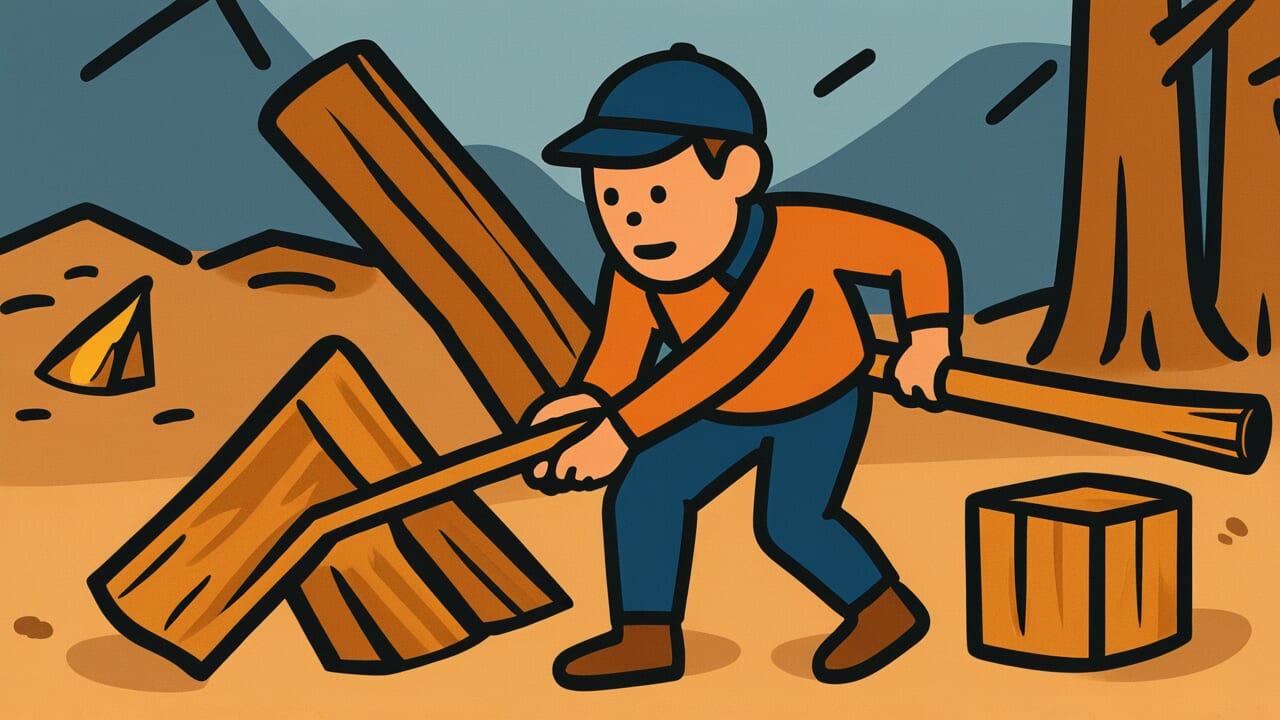How to Read “Bending the chimney to move the firewood”
Totsu wo magete takigi wo utsusu
Meaning of “Bending the chimney to move the firewood”
“Bending the chimney to move the firewood” means preventing disaster before it happens. If you bend the chimney instead of leaving it straight and move the firewood away from it, you can prevent the major disaster of a house fire.
This proverb teaches the importance of removing causes of problems before they occur, rather than frantically dealing with them after they happen.
People use this saying when discussing risk management or preventive measures. It’s also used when trouble occurs because someone neglected advance preparation.
Even today, this way of thinking applies to many situations. We detect diseases early through health checkups. We prevent accidents through regular equipment inspections. We avoid trouble by checking contract terms beforehand.
This proverb tells us that plain, unnoticed preventive measures are actually the most valuable actions we can take.
Origin and Etymology
This proverb likely comes from a story recorded in the ancient Chinese text “Huainanzi.” After a house fire, a guest said to the owner: “I warned you before that your straight chimney and firewood stacked near it were dangerous, but you didn’t listen.”
“If you had bent the chimney and moved the firewood away back then, the fire would never have happened.”
A straight chimney lets sparks fly high and easily catch the roof on fire. Firewood placed near the chimney risks spontaneous combustion from the heat.
In this story, people praised those who helped put out the fire. But they forgot about the guest who had warned them beforehand.
This proverb came to Japan and became established as a teaching about the importance of prevention. People who deal with disasters after they happen get recognized easily. But the achievements of those who prevent disasters go unnoticed.
Yet true wisdom lies in taking action before problems arise. This deep insight is what this saying conveys to us.
Usage Examples
- Making security measures perfect before introducing a new system is exactly like bending the chimney to move the firewood
- He avoided trouble by checking even the fine print in the contract, truly bending the chimney to move the firewood
Universal Wisdom
The universal truth shown by “Bending the chimney to move the firewood” is the contradiction in how human society values things. People praise the firefighter as a hero. But nobody notices the person who prevented the fire. Why? Because disasters that never happen remain invisible.
Humans have a tendency to focus on dramatic events happening right before their eyes. They overlook quiet preventive measures taking place in the background.
This happens because our brains evolved to react sensitively to change and crisis. But true wisdom means understanding this instinctive human tendency and deliberately finding value in plain prevention.
This proverb has been passed down through generations because people have painfully realized how difficult prevention is to practice, even when they understand its importance.
Continuing unnoticed efforts, doing what’s right even without recognition, and recognizing the value of nothing happening—all of these go against human instinct.
That’s exactly why our ancestors wanted to leave this teaching to future generations. True wise people prevent disasters before they occur.
They continue taking preventive measures silently, even when their achievements go unrecognized.
When AI Hears This
When you push long firewood straight, friction force applies evenly across its entire length and it won’t move. But when you lift one end and bend it, the contact area becomes half, and friction force also drops to half.
More importantly, the force vector changes. Pushing straight applies force only horizontally. But lifting and bending adds upward diagonal force, reducing normal force.
Since friction force is proportional to normal force, the more you lift, the more friction decreases.
Physics’ principle of least action shows that all motion in nature chooses the most energy-efficient path. Bending firewood seems like extra work at first glance. But it’s actually the optimal solution that minimizes total energy consumption.
For example, pushing 100 kilograms of firewood horizontally requires 50 kilograms of force with a friction coefficient of 0.5. But lifting it 30 degrees reduces normal force to about 87 kilograms, dropping required force to around 43 kilograms.
The same structure appears in human relationships. Trying to persuade someone head-on maximizes psychological resistance, like friction. But taking what seems like a detour through casual conversation and empathy changes the resistance vector and makes hearts move more easily.
Physical laws teach us wisdom: rather than forcing your way through obstacles, change the direction of force to reduce resistance itself.
Lessons for Today
This proverb teaches you the value of unnoticed effort. On social media, posts about solving problems get “likes.” But daily small considerations that prevent problems in the first place get no praise from anyone. Yet the latter is what truly matters.
Think about health management. Moderate daily exercise, balanced meals, sufficient sleep. These are plain activities that nobody praises you for continuing. But they’re much easier and more effective than treating illness after it strikes.
Human relationships work the same way. Expressing gratitude regularly, keeping small promises, showing consideration for others. These accumulated actions prevent major troubles.
Modern society tends to rush for results and seek flashy success. But what truly protects your life are preventive measures taken where nobody’s watching.
Keep doing what you believe is right, even without recognition. Peaceful days where nothing happens are proof of your wise choices.
You yourself should recognize that value.



Comments